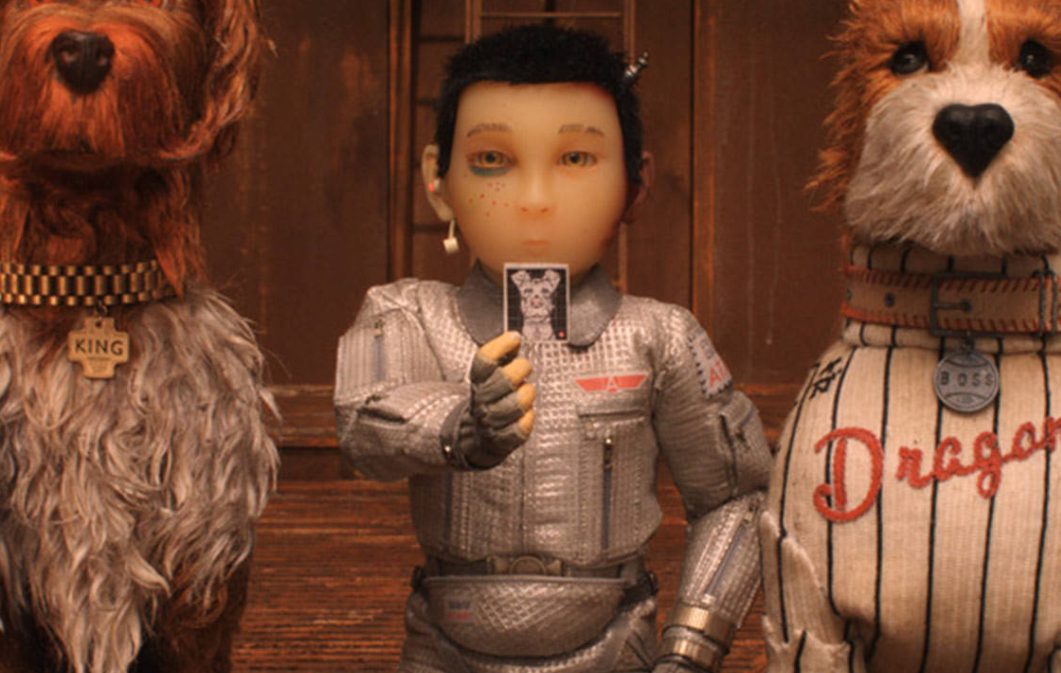When the corrupt mayor of Japanese city Megasaki banishes all dogs to “trash island” on the pretext of public health, only 12-year-old Atari stands by man’s best friend as he journeys there to find his beloved dog, Spots. However, a far more sinister and ancient rivalry is brewing behind the scenes – bringing a hatred which threatens to usher in a canine holocaust.
Yes, you read that correctly: a canine holocaust. Underneath the irreverent tone of Wes Anderson’s latest movie (set by the Japanese text, selective translating and opening prologue) there are quite sinister elements in the mix here. There may be comedy fighting in dust clouds (stunningly rendered in stop motion), OTT flashbacks and a dog ownership ceremony which is rendered like a marriage. But ears are torn off, political undesirables are assassinated and topics such as animal experimentation are not shied away from. Throw in a massive dollop of Japanese stereotypes and culture courtesy of the setting (specifically nods to Kurosawa and artists such as Hokusai via the futuristic dystopia of texts like Akira) and all of the ingredients are here for a film which shouldn’t work.
But work it does, if not quite perfectly. Partly this is down to the fact that the film is visually ravishing. There is more attention to detail than can be appreciated in one sitting, with the den under a mountain of crushed sake bottles being particularly striking. The entire production feels lavish and intelligently designed, with imaginative little touches such as televised scenes being rendered in traditional animation being par for the course. Alexandre Desplat’s score also plays a big part in uniting Japan and the West, from pounding taiko drums to a more orchestral finale. It’s intelligently understated and works as a fine foil for the more excessive characterisation on display.
Things start off brilliantly: when the focus sits squarely on ‘the Little Pilot’ landing and the effect this has on the abandoned gang of pooches led by Chief (Bryan Cranston), things are tonally perfect. A real sense of community is created through a handful of characters, which is extraordinary considering that the only ones talking English are dogs. It’s jarring when Rex (voiced gamely by Edward Norton) and company are rather sidelined for the plot to instead become about Atari essentially taming Chief. Throw in a subplot back on the mainland about human political corruption lead by an American exchange student and proceedings start to lose some of the magic.
To its credit, whilst it seems to revel in deftly juggling yet more plates as things become increasingly exaggerated, Isle of Dogs never becomes incomprehensible or feels out of control. Instead, when yet more humans and dogs are introduced, it just begins to feel a bit stuffed. There may be some superstar names in the cast but the lines they receive as the film marches on are spread very thinly indeed (perhaps this explains the baffling credit of Anjelica Huston as a “mute poodle”? So much voice talent seems to have been squandered that this reads as maybe not the joke it’s intended to be). All plot strands converge for the finale and unfortunately this proves to be the weakest part of the movie. By this point, with zeal to reach a conclusion come hell or high water, it feels like some of the more satisfying moments have been jettisoned. Perhaps less would have been more advisable here.
Overall, whilst this film doesn’t sustain the sheer beauty it quickly strikes in the first half, it is a superbly rendered little gem. For every little element of original genius like the dog Oracle, there are some less successful features such as Greta Gerwig’s student activist. Bursting at the seams with imagination, perhaps to a fault, this is an inspired choice to open GFF18.
